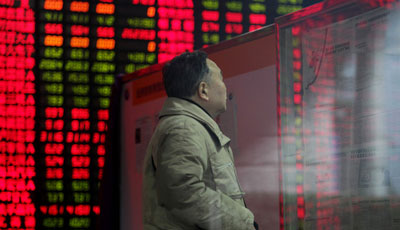China to Waive Capital-Gains Tax for Foreigners on Link

China will waive capital-gains taxes for foreign stock investors using the Shanghai-Hong Kong (HSCEI) bourse link, clarifying its rules three days before the program’s debut provides unprecedented access to mainland shares.
Chinese individuals who buy Hong Kong equities through the link get a three-year exemption, while mainland companies using the connect will be charged tax, the Ministry of Finance said in a statement today. Futures on the Hang Seng China Enterprises Index rose 1.2 percent after the official close of Hong Kong’s stock exchange and contracts on the Hang Seng Index climbed 0.8 percent at 5:36 p.m. local time.
International money managers have been seeking to resolve confusion over the tax policy before the Hong Kong-Shanghai exchange link starts on Nov. 17, giving overseas traders a new route to access China’s $4.2 trillion stock market. MSCI Inc., which kept mainland shares out of its global indexes in June, said the lack of clarity on tax policy was one of investors’ biggest concerns.
“It’s positive news for the market and foreign investors,” Zhang Gang, a strategist at Central China Securities Co. in Shanghai, said by phone. “The stock connect can start in a stable manner on Monday.”
MSCI Review
While the nation’s laws had suggested foreign equity investors were subject to a capital gains tax, the government has never collected it, according to PricewaterhouseCoopers. Confusion over the policy since China’s quota system for a limited number of foreign institutions began more than a decade ago has led to a mishmash of compliance, with some setting aside cash for the liability and others anticipating it won’t be implemented, according to HSBC Jintrust Fund Management.
China is counting on demand from foreign money managers to boost equity valuations, turn Shanghai into a global financial center and increase global use of the yuan. Tax policy was one of several market-structure shortcomings, including capital controls and rules against same-day trading, cited by investors when MSCI gathered views on mainland shares for its June index decision.
“Foreign institutional investors were worried about this issue,” said Benjamin Tam, a Hong Kong-based portfolio manager who helps oversee about $1.5 billion at IG Investment Ltd.
Mainland Laws
The exchanges agreed in April to allow a net 23.5 billion yuan ($3.8 billion) of daily cross-border purchases, opening up the mainland market further to foreigners while giving wealthy Chinese investors a route to buy Hong Kong stocks.
For traders based in the mainland, the nation’s personal-income laws stipulate a 20 percent tax, though authorities have exempted them from the levy since 1994 to promote development of the stock market.
The Shanghai Composite Index (SHCOMP) has climbed 17 percent this year amid speculation government stimulus will boost economic growth and that the exchange link will lure arbitragers to mainland shares trading at a lower prices than their Hong Kong-listed counterparts.
Money managers who had previously wanted to avoid China’s tax regime could get exposure to the country by purchasing shares of mainland companies in Hong Kong, which has no capital gains tax. The Hang Seng China Enterprises index of so-called H shares has climbed 17 percent since reaching this year’s low on March 20.
“Many people were hesitating to do this program because of the tax issue,” said Alex Wong, a Hong Kong-based asset-management director at Ample Capital Ltd. “Institutions would be OK to join after this. What people needed was a clear structure.”
Source: Bloomberg – China to Waive Capital-Gains Tax for Foreigners on Link





























